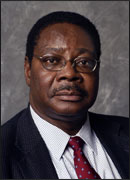As part of his continuing efforts to serve his native country, A. Peter Mutharika, J.S.D., professor of law, has been named Malawi’s Chief Advisor to the President on Constitutional, Legal and International Affairs.
Mutharika currently is on leave in Malawi for the 2007-08 academic year. Upon his return, he will serve as Washington University School of Law’s Charles Nagel Professor of International and Comparative Law. The professorship is named for Nagel, LL.B. 1875, who was United States Secretary of Commerce and Labor under President Taft, a member of the Missouri House of Representatives, a member of Washington University’s Board of Directors and a part-time law lecturer. The estate of Nagel’s law partner, Daniel Noyes Kirby, LL.B. 1888, made the professorship possible.

“Peter’s international work, including in his native Malawi, is extraordinary,” said Kent Syverud, J.D., law dean and the Ethan A.H. Shepley University Professor. “The chaired professorship recognizes his outstanding contributions to international law as well as to the law school and Washington University communities.”
This is not the first time that Mutharika has served as advisor to his brother, Bingu wa Mutharika, who was elected to a five-year term as Malawi’s president in 2004. He also was the strategic advisor to his brother’s presidential campaign. After the victory, Mutharika helped the president form a 19-member cabinet.
In his current role, Mutharika is advising his brother on the constitutionality of the president’s decisions, constitutional reforms and judicial appointments. He also acts as a special presidential envoy to other heads of state and heads of international organizations.
“Over the past several months, I have been on diplomatic missions to six countries on three continents,” Mutharika said. “What is challenging about the job is the fascinating interplay of law, politics and diplomacy. We are doing our best, and Malawi’s efforts are now receiving international recognition. In addition to the December 2, 2007, front page article in The New York Times, we have received accolades for sound economic management from the World Bank, the United Nations’ Food and Agriculture Organization, Kofi Annan’s Association for a Green Revolution in Agriculture and the Economist Intelligence Unit.”
“The job gives me a once in a lifetime opportunity to make a direct contribution to our country and to sometimes see the results directly,” he continued. “Here everything is a priority, but we have ‘priorities within priorities.’ The main issues facing Malawi are issues of food security, which we have now accomplished; better health for our people; better opportunities for education; infrastructural development and better access to clean water by more people.”
While in Malawi, Mutharika also is serving as the Advisor to the American Bar Association’s Rule of Law Initiative for Africa. The initiative is “a public service project dedicated to promoting the rule of law around the world” as the “most effective long-term antidote to the pressing problems facing the world community today, including poverty, economic stagnation, and conflict.” Additionally, he is chairing the Institute for Democracy and Policy Studies, a newly established think tank designed to enhance Malawi’s democracy and state capacity.
An expert on international economic law, international law and comparative constitutional law, Mutharika is the author of numerous books and articles. His forthcoming book on international trade, “Foreign Investment Security in Sub-Saharan Africa: The Emerging Policy and Legal Frameworks,” will be released by Martinus Nijhoff Publishers (Leiden, Netherlands) in the spring.
This book describes the efforts by the 48 Sub-Saharan African countries to create conditions that will make foreign direct investment attractive to the region. The first section looks at the policy frameworks that underpin these measures and the second section deals with the emerging legal frameworks for attracting foreign investment.
Mutharika notes that despite rates of return on foreign direct investment that have averaged between 25 and 30 percent over the past several years, the African region has not managed to attract more than 3 percent of global foreign direct investment. According to Mutharika, the inability to attract significant foreign private capital has created economies that are too dependent on foreign aid.
Among his other professional activities, Mutharika continues his work as a member of the Panel of Arbitrators and Panel of Conciliators for the International Centre for Settlement of Investment Disputes.